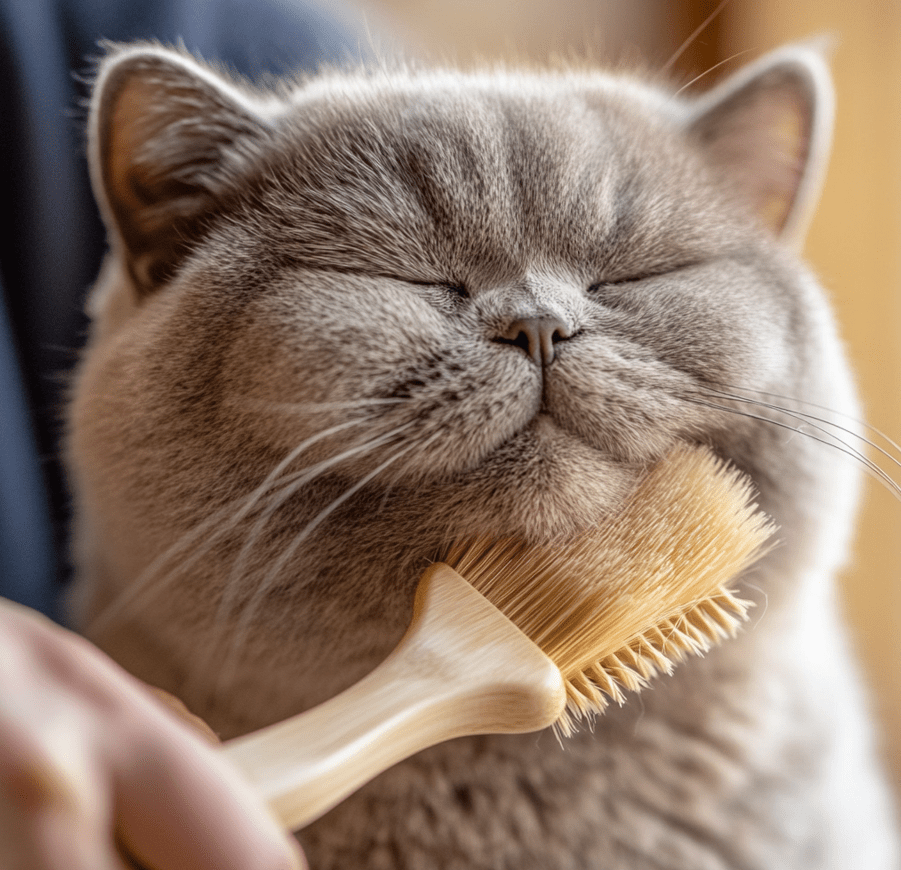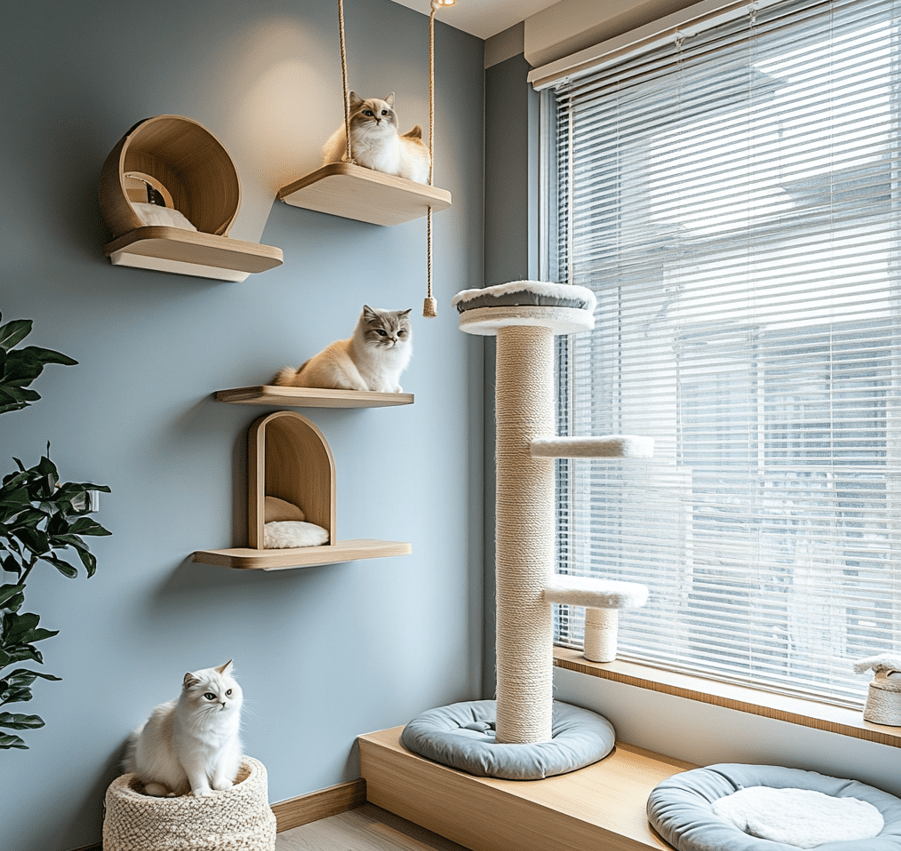
British Shorthair cats, with their dense, plush coats and affectionate, laid-back personalities, are cherished companions known for their sturdy build and charming, teddy-bear-like faces. While these robust felines adapt well to various environments, seasonal changes can impact their health and comfort. Seasonal health tips for British Shorthairs are essential to ensure they thrive year-round, whether facing chilly winters or sweltering summers. This comprehensive guide explores tailored care strategies for winter and summer, covering diet, grooming, environmental adjustments, and veterinary needs to keep your British Shorthair healthy and happy in any season.
Understanding Seasonal Impacts on British Shorthairs
British Shorthairs, with their thick coats and stocky frames (9-18 pounds), are sensitive to temperature extremes and environmental shifts. Winter brings risks like dry skin, joint stiffness, and respiratory issues, while summer can lead to overheating, dehydration, and parasite exposure. Seasonal care involves adapting their routine to address these challenges, ensuring their physical and emotional well-being. By understanding how seasons affect your cat, you can implement proactive measures to prevent health issues and maintain their quality of life.
Why British Shorthairs Need Seasonal Care
Several factors make seasonal care critical for British Shorthairs:
Dense Coat: Their double-layered coat provides insulation but requires different grooming approaches in winter (to prevent matting) and summer (to reduce heat retention).
Body Weight: Their sturdy build predisposes them to obesity, which can worsen with reduced activity in winter or stress in summer.
Health Sensitivities: British Shorthairs are prone to conditions like urinary tract issues, allergies, and joint problems, which seasonal changes can exacerbate.
Indoor Lifestyle: Many British Shorthairs live indoors, making environmental control (humidity, temperature) vital for their comfort.
Tailoring care to each season helps mitigate these risks and keeps your cat thriving.
Winter Health Tips for British Shorthairs
Winter poses unique challenges for British Shorthairs, from cold temperatures to dry indoor air. Below are targeted strategies to keep your cat healthy during the colder months.
1. Maintain a Warm Environment
British Shorthairs tolerate cold better than some breeds, but prolonged exposure or chilly indoor conditions can cause discomfort, especially for seniors.

Keep Indoor Temperatures Stable: Maintain your home between 68-75°F (20-24°C) to ensure comfort. Avoid placing beds near drafty windows or doors.
Provide Cozy Bedding: Offer plush, orthopedic beds, like those from PetFusion, in warm, quiet areas. Heated cat beds, such as K&H Pet Products Thermo-Kitty Bed, are ideal for seniors with joint issues.
Avoid Outdoor Exposure: Limit outdoor time in freezing weather to prevent hypothermia or frostbite, particularly on paws and ears.
Use Humidifiers: Indoor heating can dry the air, causing skin irritation or respiratory issues. A humidifier, like the Levoit Classic 300S, maintains 40-60% humidity, benefiting your cat’s skin and airways.
A warm, humid environment keeps your British Shorthair comfortable and healthy in winter.
2. Adjust Grooming for Winter
Winter grooming focuses on maintaining coat health and preventing matting, as British Shorthairs shed less but retain their thick undercoat.
Brush Weekly: Brush 1-2 times weekly with a soft-bristled brush or de-shedding tool, like the Hertzko Self-Cleaning Brush, to remove loose fur and prevent mats. Focus on the belly and hindquarters.
Check for Dry Skin: Inspect for flaking or dandruff, which dry air can worsen. Use a vet-recommended moisturizing spray, like TropiClean Oxymed, if needed.
Limit Baths: Bathe only every 6-8 weeks with a hydrating shampoo, like Virbac Epi-Soothe, to avoid stripping natural oils. Ensure thorough drying to prevent chills.
Trim Nails: Keep nails trimmed to avoid snagging on bedding or scratching irritated skin.
Proper grooming supports coat insulation and skin health during winter.
3. Support Joint Health
Cold weather can exacerbate joint stiffness, especially in older British Shorthairs prone to arthritis.
Provide Soft Surfaces: Place padded mats or rugs on hard floors to ease joint pressure. Low ramps, like PetSafe CozyUp, help access furniture without jumping.
Encourage Gentle Exercise: Use feather wands or laser pointers for short play sessions (5-10 minutes daily) to maintain mobility without overexertion.
Consider Supplements: Vet-approved joint supplements, like Cosequin or Dasuquin, containing glucosamine and chondroitin, support cartilage health. Consult your vet for dosing.
Keep Weight in Check: Excess weight strains joints, so monitor portions and use a body condition score chart to maintain an ideal weight.
Joint-focused care ensures your cat stays active and comfortable in winter.
4. Optimize Winter Nutrition
Winter diets should support energy needs and hydration, as indoor cats may drink less in colder months.
High-Quality Protein: Choose foods with digestible proteins, like chicken or fish, to maintain muscle mass. Brands like Royal Canin Indoor or Hill’s Science Diet Adult are ideal.
Incorporate Wet Food: Wet food, with 70-80% moisture, boosts hydration and supports kidney and urinary health, critical for British Shorthairs. Feed daily to complement dry kibble.
Omega-3 Fatty Acids: Foods or supplements with fish oil, like Nordic Naturals Omega-3 Pet, reduce inflammation and keep the coat healthy.
Avoid Overfeeding: Reduced activity can lead to weight gain, so measure portions with a cup and follow feeding guidelines.
Consult your veterinarian to adjust your cat’s diet for winter needs.
5. Monitor Respiratory Health
Dry air and indoor allergens can trigger respiratory issues in British Shorthairs.
Use Air Purifiers: HEPA filters, like those from Dyson, reduce dust and dander, improving air quality.
Clean Regularly: Vacuum with a pet-hair-specific vacuum, like the Shark Navigator, to minimize allergens. Wash bedding weekly.

Watch for Symptoms: Sneezing, wheezing, or runny eyes may indicate allergies or infections. Contact your vet if symptoms persist.
Avoid Smoke Exposure: Keep your cat away from fireplaces or cigarette smoke, which can irritate airways.
A clean, allergen-free environment supports respiratory health in winter.
Summer Health Tips for British Shorthairs
Summer brings heat, humidity, and parasites, posing different challenges for British Shorthairs. Below are strategies to keep your cat cool and healthy during warmer months.
1. Prevent Overheating
British Shorthairs’ thick coats make them prone to overheating, especially in temperatures above 85°F (29°C).
Maintain Cool Temperatures: Keep your home between 70-78°F (21-26°C) using air conditioning or fans. Provide shaded areas if outdoors.
Offer Cooling Mats: Cooling mats, like the Green Pet Shop Self-Cooling Pad, provide a comfortable spot to rest. Place in favorite lounging areas.
Ensure Ventilation: Open windows with secure screens or use fans to circulate air, avoiding stuffy rooms.
Limit Sun Exposure: Prevent prolonged sunbathing, especially for light-colored cats, to avoid sunburn on ears or nose.
A cool environment prevents heatstroke and keeps your cat comfortable.
2. Enhance Summer Grooming
Summer grooming reduces heat retention and removes loose fur during heavier shedding periods.
Brush Frequently: Brush 2-3 times weekly with a de-shedding tool, like the FURminator, to remove loose undercoat. Daily brushing is ideal during peak shedding in spring/summer.
Bathe More Often: Bathe every 4-6 weeks with a cooling shampoo, like Burt’s Bees for Cats, to remove excess fur and keep the coat light. Dry thoroughly to prevent skin issues.
Check for Mats: Inspect for matting in humid conditions, gently combing out tangles or seeking professional grooming if severe.
Clean Ears and Paws: Wipe ears weekly with a vet-approved cleaner and check paws for debris, as summer outdoor time increases exposure.
Frequent grooming keeps your British Shorthair cool and reduces shedding mess.
3. Promote Hydration
Dehydration is a summer risk, particularly for British Shorthairs prone to urinary issues.
Provide Fresh Water: Ensure clean, fresh water is available at all times, changed daily to stay appealing.
Use a Cat Water Fountain: Fountains, like the Catit Flower Fountain, encourage drinking, keeping your cat hydrated.
Multiple Water Stations: Place bowls in various locations, away from food and litter boxes, to make drinking accessible.
Increase Wet Food: Feed wet food daily to boost moisture intake, supporting kidney and urinary health. Try brands like Purina Pro Plan or Wellness CORE.
Monitor water intake and consult your vet if your cat drinks less or urinates irregularly.
4. Protect Against Parasites
Summer increases exposure to fleas, ticks, and mosquitoes, which can harm British Shorthairs.
Use Flea Preventatives: Apply vet-approved products, like Revolution or Bravecto, monthly to prevent flea allergy dermatitis and infestations.
Check for Ticks: Inspect your cat’s coat after outdoor time, focusing on ears, neck, and belly. Remove ticks with tweezers or seek veterinary help.
Prevent Heartworm: Use heartworm preventatives, like Heartgard, as mosquitoes can transmit this deadly parasite, even to indoor cats.
Treat the Environment: Vacuum regularly and use pet-safe flea sprays to eliminate parasites in your home.
Consistent parasite control protects your cat and prevents skin irritation or disease.
5. Manage Allergies and Skin Health
Summer allergens, like pollen or grass, can trigger reactions in British Shorthairs.
Monitor for Allergies: Watch for itching, sneezing, or watery eyes, which may indicate pollen or dust allergies. Consult your vet for antihistamines or shampoos if needed.
Use Hypoallergenic Products: Choose unscented litter and pet-safe cleaners to avoid skin irritation.
Groom Regularly: Brushing and occasional baths remove allergens from the coat, reducing reactions.
Check for Hot Spots: Inspect for red, weepy areas from scratching, which may require veterinary treatment.
Proactive allergy management keeps your cat’s skin healthy and comfortable.
Year-Round Health Tips for British Shorthairs
Some health practices benefit British Shorthairs in both winter and summer, ensuring consistent care.
1. Schedule Regular Veterinary Checkups
Routine vet visits are crucial for monitoring seasonal health risks and catching issues early.
Annual or Biannual Exams: Regular checkups assess weight, joints, skin, and urinary health, adjusting care for seasonal needs.
Blood and Urine Tests: These detect early signs of kidney disease, urinary issues, or allergies, common in British Shorthairs.
Vaccinations: Ensure core vaccines (e.g., FVRCP) are up to date, especially if outdoor exposure increases in summer.
Dental Care: Regular cleanings prevent oral health issues that can cause stress or reduced appetite.
Veterinary care provides a foundation for year-round wellness.
2. Maintain a Healthy Weight
Obesity exacerbates seasonal health risks, from joint pain in winter to overheating in summer.

Monitor Body Condition: Use a body condition score chart to ensure a defined waistline and palpable ribs.
Control Portions: Measure food with a cup and follow feeding guidelines for your cat’s ideal weight (typically 9-14 pounds for females, 12-18 for males).
Encourage Exercise: Engage in daily play with toys like feather wands or laser pointers to promote activity year-round.
Weight management supports overall health and reduces seasonal complications.
3. Manage Stress
Seasonal changes, like holiday guests in winter or thunderstorms in summer, can stress British Shorthairs.
Create Safe Spaces: Provide high perches or cozy hideaways for retreat during noisy events.
Use Pheromone Diffusers: Feliway diffusers reduce anxiety from seasonal disruptions.
Enrich Their Environment: Offer scratching posts, puzzle feeders, and window perches for mental stimulation.
Maintain Routine: Consistent schedules for feeding, play, and litter box cleaning minimize stress.
A stress-free environment supports emotional and physical health year-round.
Seasonal Health Risks to Watch For
Each season brings specific health concerns for British Shorthairs:
Winter:
Joint Stiffness: Cold can worsen arthritis, causing limping or reluctance to jump.
Respiratory Infections: Dry air increases susceptibility to upper respiratory issues.
Weight Gain: Reduced activity can lead to obesity, straining kidneys and joints.
Summer:
Heatstroke: Symptoms include panting, lethargy, or vomiting, requiring immediate cooling and veterinary care.
Urinary Issues: Dehydration can exacerbate FLUTD, causing straining or blood in urine.
Parasite Infections: Flea bites or heartworm can cause itching, anemia, or severe illness.
Prompt veterinary attention for these symptoms prevents serious complications.
Choosing the Right Products for Seasonal Care
High-quality products enhance your seasonal care efforts:
Winter:
Heated Beds: K&H Pet Products or Pet Magasin offer safe, warm options.
Humidifiers: Levoit or Pure Enrichment maintain optimal humidity.
Joint Supplements: Cosequin or Vetoquinol Flexadin support mobility.
Summer:
Cooling Mats: Arf Pets or Green Pet Shop keep cats comfortable.
Flea Preventatives: Revolution or Frontline provide reliable protection.
Water Fountains: Catit or PetSafe encourage hydration.
Year-Round:
Food: Royal Canin, Hill’s, or Purina Pro Plan offer balanced nutrition.
Grooming Tools: FURminator or Hertzko brushes manage shedding.
Litter: Unscented, dust-free options like Dr. Elsey’s minimize irritation.
Read labels, check for veterinary endorsements, and consult your vet to ensure products suit your cat.
Common Mistakes to Avoid
When providing seasonal care for British Shorthairs, avoid these pitfalls:
Ignoring Temperature Extremes: Exposing your cat to drafts in winter or heat in summer can cause illness.
Skipping Grooming Adjustments: Infrequent brushing in summer or over-bathing in winter disrupts coat health.
Neglecting Hydration: Relying solely on dry food, especially in summer, risks dehydration.
Overlooking Stress: Seasonal disruptions can trigger anxiety, exacerbating health issues like FLUTD.
Proactive, season-specific care prevents these mistakes and promotes well-being.
Advances in Feline Seasonal Care
Recent innovations improve seasonal health management for British Shorthairs:
Smart Thermostats: Devices like Nest maintain consistent indoor temperatures.
Advanced Nutrition: Seasonal formulas, like Hill’s Indoor Cat, address specific needs.
Wearable Monitors: Pet trackers, like Whistle, monitor activity and detect health changes.
Telemedicine: Virtual vet consultations provide quick access to seasonal advice.
These advancements make it easier to keep your cat healthy year-round.
Conclusion

Seasonal health tips for British Shorthairs are vital for ensuring their comfort and longevity, whether braving winter’s chill or summer’s heat. By adjusting grooming, nutrition, environmental conditions, and veterinary care to each season’s demands, you can prevent issues like joint pain, dehydration, or parasite infections. Winter calls for warmth, joint support, and hydration, while summer demands cooling, flea control, and allergy management. Year-round practices, like weight control and stress reduction, provide a strong foundation for health.
With dedication and the right strategies, you can keep your British Shorthair thriving in any season. For personalized advice, consult your veterinarian to tailor a seasonal care plan for your beloved feline companion.




